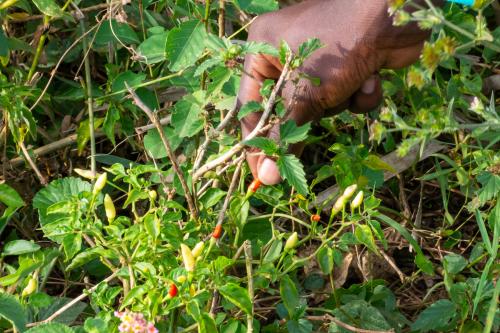South Africa avoids disruption in social benefits for 17 million people
Hundreds of South Africans marched in Pretoria earlier this week against the potential non-payment of monthly welfare benefits that could affect 17 million people starting April 1. The opposition Democratic Alliance party organized the protests in light of uncertainty surrounding the South African Social Security Agency’s (SASSA) ability to secure payment arrangements for beneficiaries after March 31.
At issue was the expiration of a contract between SASSA and its current payment service-provider, Net1 UEPS Technologies Inc.’s Cash Paymaster Services unit. SASSA awarded Net1 a five-year contract in 2012. However, two years later, the Constitutional Court ruled that the contract was invalid because the welfare agency did not follow government procurement procedures. Furthermore, it called on SASSA to take over payment distribution itself or open a new tender process and identify a different payment service provider by April 1, 2017. Still, after the Constitutional Court’s ruling, Net1 continued making payments while SASSA failed to comply with the Constitutional Court’s decision.
With less than a month until the expiration of the Net1’s contract—and still no firm plan for the continuation of payments on April 1—opposition members called for the resignation of Social Development Minister Bathabile Dlamini. On the other hand, Finance Minister Pravin Gordhan stated on Tuesday this week, “I am fairly confident grants will be paid,” while President Jacob Zuma defended Minister Dlamini on Thursday, inquiring, “Why punish somebody before anything happens? That’s a funny democracy.”
The impasse was temporarily addressed on Friday, when the Constitutional Court revisited its previous ruling—that SASSA’s contract with Net1 was invalid—and decided to suspend it for 12 months. This allows Net1 to continue distributing payments under the terms and conditions of the previous contract until another entity is able to take over its role. The Social Development Department and SASSA will also be required to report on the progress of a new contract every three months, according to the new decision. South Africa provides nearly 150 billion rand ($11 billion) in benefits annually, which include grants for child support, pensions, and other benefits to almost a third of South Africans.
Côte d’Ivoire’s cocoa and Madagascar’s vanilla farmers contend with poor, damaged crops
A cocoa crisis continues to wrack Côte d’Ivoire, the world’s largest cocoa producer. Rapidly dropping international cocoa prices have not only been creating issues for the government—reducing its revenues and widening the budget deficit just as the government also agreed to make unscheduled payments to soldiers and civil servants this year—but are also posing serious challenges to buyers and farmers. Last July, cocoa futures had reached a peak, but prices have dropped by more than a third since then due to an anticipated surplus. According to the BBC, this drop, in addition to the national government’s increase of the minimum fixed price that farmers must receive from buyers, has created a quagmire for buyers. Since buyers buy their stock a year in advance, if they honor their contracts, they face massive losses. This week, compounding these challenges, local cocoa grinders are stating that poor quality—particularly high acidity—of the beans means they can only buy 30 to 50 percent of the beans available. Farmers claim that without their current payments they cannot invest in their farms, as they cannot afford fertilizer or pesticides.
In other news, earlier this week, a massive tropical cyclone—the worst in over a decade—hit Madagascar, killing almost 80 people and may have devastated the island nation’s vanilla crop. Bloomberg reports that up to 30 percent of this year’s crop may have been damaged. With flooded fields, vanilla farmers face major obstacles to purchasing food and other necessary items. At the same time, this event will likely drive up already high global vanilla prices—which have doubled to over $500 per kilogram since 2015—as Madagascar produces over three-quarters of the world’s supply of vanilla. Demand for vanilla has been increasing in recent years as candy manufacturers have been switching away from artificial sweeteners.
President Buhari returns to work in Nigeria following an extended medical leave
After seven weeks in the U.K.—at first for a vacation that was then extended for medical purposes—President Buhari has returned to Nigeria. Although the exact reason for his prolonged sick leave remains unclear, Buhari formally notified the National Assembly that he has resumed his duties as of Monday, March 13. In Buhari’s absence, the National Economic Council—a group which is chaired by Vice President Yemi Osinbajo (who served as acting president) and includes state governors, the central bank governor, and the finance minister—called for an urgent review of the country’s foreign exchange policy, which led the central bank to devalue the naira for private individuals. On Thursday this week, Buhari made a rare appearance at a meeting of the NEC and, according to a presidency statement, directed the central bank and finance ministry to provide funds to the federal states to cover the salaries of civil servants whose pay has been delayed due to oil revenue shortages. He stated, “I will not rest until I address those issues that affect our people…It is most important that workers are able to feed their families, pay rent and school fees, then other things can follow.”




Commentary
Africa in the news: South Africa’s welfare dispute, the effects of low cocoa prices on Côte d’Ivoire, and President Buhari’s return to Nigeria
March 17, 2017